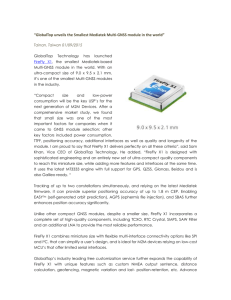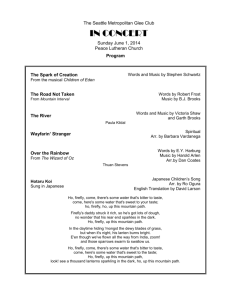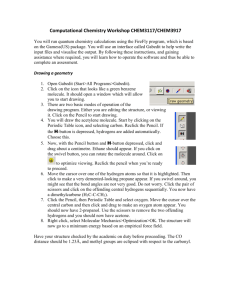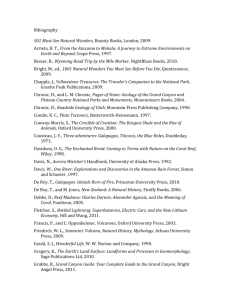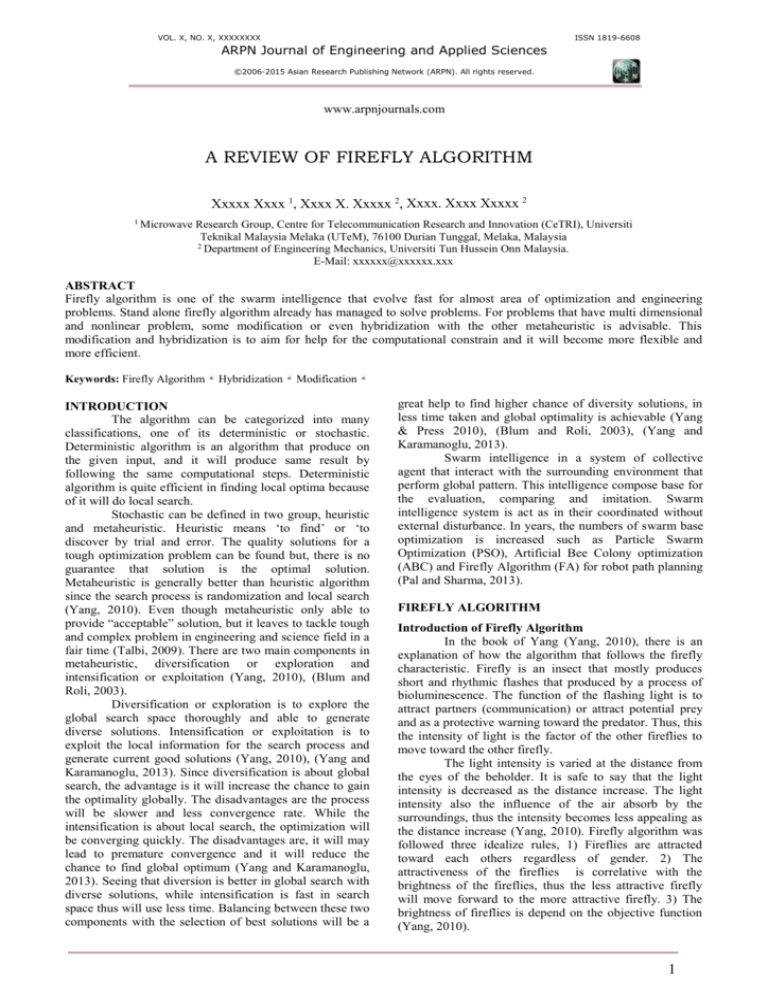
VOL. X, NO. X, XXXXXXXX
ISSN 1819-6608
ARPN Journal of Engineering and Applied Sciences
©2006-2015 Asian Research Publishing Network (ARPN). All rights reserved.
www.arpnjournals.com
A REVIEW OF FIREFLY ALGORITHM
Xxxxx Xxxx 1, Xxxx X. Xxxxx 2, Xxxx. Xxxx Xxxxx 2
1 Microwave
Research Group, Centre for Telecommunication Research and Innovation (CeTRI), Universiti
Teknikal Malaysia Melaka (UTeM), 76100 Durian Tunggal, Melaka, Malaysia
2 Department of Engineering Mechanics, Universiti Tun Hussein Onn Malaysia.
E-Mail: xxxxxx@xxxxxx.xxx
ABSTRACT
Firefly algorithm is one of the swarm intelligence that evolve fast for almost area of optimization and engineering
problems. Stand alone firefly algorithm already has managed to solve problems. For problems that have multi dimensional
and nonlinear problem, some modification or even hybridization with the other metaheuristic is advisable. This
modification and hybridization is to aim for help for the computational constrain and it will become more flexible and
more efficient.
Keywords: Firefly Algorithm
Hybridization
Modification
INTRODUCTION
The algorithm can be categorized into many
classifications, one of its deterministic or stochastic.
Deterministic algorithm is an algorithm that produce on
the given input, and it will produce same result by
following the same computational steps. Deterministic
algorithm is quite efficient in finding local optima because
of it will do local search.
Stochastic can be defined in two group, heuristic
and metaheuristic. Heuristic means ‘to find’ or ‘to
discover by trial and error. The quality solutions for a
tough optimization problem can be found but, there is no
guarantee that solution is the optimal solution.
Metaheuristic is generally better than heuristic algorithm
since the search process is randomization and local search
(Yang, 2010). Even though metaheuristic only able to
provide “acceptable” solution, but it leaves to tackle tough
and complex problem in engineering and science field in a
fair time (Talbi, 2009). There are two main components in
metaheuristic, diversification or exploration and
intensification or exploitation (Yang, 2010), (Blum and
Roli, 2003).
Diversification or exploration is to explore the
global search space thoroughly and able to generate
diverse solutions. Intensification or exploitation is to
exploit the local information for the search process and
generate current good solutions (Yang, 2010), (Yang and
Karamanoglu, 2013). Since diversification is about global
search, the advantage is it will increase the chance to gain
the optimality globally. The disadvantages are the process
will be slower and less convergence rate. While the
intensification is about local search, the optimization will
be converging quickly. The disadvantages are, it will may
lead to premature convergence and it will reduce the
chance to find global optimum (Yang and Karamanoglu,
2013). Seeing that diversion is better in global search with
diverse solutions, while intensification is fast in search
space thus will use less time. Balancing between these two
components with the selection of best solutions will be a
great help to find higher chance of diversity solutions, in
less time taken and global optimality is achievable (Yang
& Press 2010), (Blum and Roli, 2003), (Yang and
Karamanoglu, 2013).
Swarm intelligence in a system of collective
agent that interact with the surrounding environment that
perform global pattern. This intelligence compose base for
the evaluation, comparing and imitation. Swarm
intelligence system is act as in their coordinated without
external disturbance. In years, the numbers of swarm base
optimization is increased such as Particle Swarm
Optimization (PSO), Artificial Bee Colony optimization
(ABC) and Firefly Algorithm (FA) for robot path planning
(Pal and Sharma, 2013).
FIREFLY ALGORITHM
Introduction of Firefly Algorithm
In the book of Yang (Yang, 2010), there is an
explanation of how the algorithm that follows the firefly
characteristic. Firefly is an insect that mostly produces
short and rhythmic flashes that produced by a process of
bioluminescence. The function of the flashing light is to
attract partners (communication) or attract potential prey
and as a protective warning toward the predator. Thus, this
the intensity of light is the factor of the other fireflies to
move toward the other firefly.
The light intensity is varied at the distance from
the eyes of the beholder. It is safe to say that the light
intensity is decreased as the distance increase. The light
intensity also the influence of the air absorb by the
surroundings, thus the intensity becomes less appealing as
the distance increase (Yang, 2010). Firefly algorithm was
followed three idealize rules, 1) Fireflies are attracted
toward each others regardless of gender. 2) The
attractiveness of the fireflies is correlative with the
brightness of the fireflies, thus the less attractive firefly
will move forward to the more attractive firefly. 3) The
brightness of fireflies is depend on the objective function
(Yang, 2010).
1
VOL. X, NO. X, XXXXXXXX
ISSN 1819-6608
ARPN Journal of Engineering and Applied Sciences
©2006-2015 Asian Research Publishing Network (ARPN). All rights reserved.
www.arpnjournals.com
Structure of firefly algorithm
In firefly algorithm, there are two important
variables, which is the light intensity and attractiveness.
Firefly is attracted toward the other firefly that has
brighter flash than itself. The attractiveness is depended
with the light intensity.
Figure 1: Pseudo code for Firefly Algorithm (Yang, 2010).
The light intensity thus attractiveness is inversely
proportional with the particular distance r from the light
source. Thus the light and attractiveness is decrease as the
distance increase.
(1)
I
r
= light intensity,
= light intensity at initial or original light
intensity,
= the light absorption coefficient
= distance between firefly i and j
Attractiveness is proportionally to the light intensity seen
by the another fireflies, thus attractiveness is β
(2)
= Attractiveness at r is 0
The distance between two fireflies can define using
Cartesian distance
(3)
Firefly i is attracted toward the more attractive firefly j, the
movemeunt is defined as
(4)
In equation (4), the first term is for attraction, is the
limitation when the value is tend to zero or too large. If
approaching zero (
, the attractiveness and
brightness become constant,
. In another word, a
firefly can be seen in any position, easy to complete global
search. If the is nearing infinity or too large (
, the
attractiveness and brightness become decrease. The firefly
movements become random. The implementation of
firefly algorithm can be done in these two asymptotic
behaviors. While the second the term is for randomization,
as is the randomize parameter. The can be replace by
ran -1/2 which is ran is random number generated from 0
to 1.
Variation of firefly algorithm
Firefly algorithm is widely use to solve many
problems, such as solving the economic emissions load
dispatch problem (Apostolopoulos and Vlachos, 2011),
multilevel image thresholding selection (Horng & Jiang
2010), finding optimal test sequence generation
(Srivatsava, Mallikarjun and Yang, 2013), solving
travelling salesman problem (Kumbharana and Pandey,
2013), vector quantization for image compression (Horng,
2012) and object tracking (Gao et al., 2013).
Despite that firefly algorithm is widely used for
solving problem, standart firefly algorithm also have
some coming in term of trapping into several local optima
when solving complex problem (Farook and Raju, 2013), (
Yu, Yang and Su, 2013). There is disadvantages of using
of single method only, this is because it will be overly
restrictive for high dimensional and nonlinear problem.
Thus, some modification and hybridization is suggested to
overcome the shortcoming of single method (Abdullah et
al., 2012).
Modified firefly algorithm.
In standart firefly algorithm, global best is the
current best solution of firefly or known as the firefly that
hold the highest light intensity or attractiveness. This
firefly will move randomly to find the next best firefly for
the next iteration. Since the firefly is move randomly, the
attractiveness will be lose in certain distance from the
others fireflies. Thus this will lead to the loose of
performance in that particular iteration (Yang, 2010),
(Tilahun and Ong, 2012), (Hassanzadeh and Meybodi,
2012).
In paper of (Tilahun and Ong, 2012) propose that,
instead of the firefly move in random behavior, but in the
proper manner. The firefly is only move to the direction if
only there is improvement of brightness. The author
(Tilahun and Ong, 2012) propose modification is by
generate unit vector, then to determine the movement of
firefly is by direction that leads toward the increases of
brightness firefly. If there is none; the current brightest
firefly will stay in the current position. As for (Wang et
al., 2012), in the paper also done some modification
toward firefly algorithm for improvement. First is to add
Lévy flight for improvement in term of localized searching
for closer solution. In paper written by (Yu et al., 2013),
Olamaei, Moradi and Kaboodi, 2013), (Farahani et al.,
2011) is to proposed to use adaptive formulation for
2
VOL. X, NO. X, XXXXXXXX
ISSN 1819-6608
ARPN Journal of Engineering and Applied Sciences
©2006-2015 Asian Research Publishing Network (ARPN). All rights reserved.
www.arpnjournals.com
randomization value . This is because when the value of
is large it is better for firefly to explore unknown place
while small value of will make firefly for local search.
In (Farahani et al., 2011) the author also propose the
movement of firefly that is change from random
movement to direct movement. This is happen when there
is no brighter firefly from the particular firefly, then firefly
will move randomly. To avaoid this, the author propose
that the random movement is change to direct movement
and the firefly will move toward the best solution in that
iteration. This will make firefly in the better position for
next iteration and help to achive to near global best.
Hybrid firefly algorithm
Solving problem with only one metaheuristic is
rather restrictive. This is because the single metaheuristic
is hard to reach the an optimal solution within reasonable
time. Thus by combining with other metaheuristic or
called hybridization will help with the high dimentional
and nonlinear problems. Hybridize metaheuristic also can
provide a more efficient behavior and a higher flexibility
when dealing with real-world and large scale problems
(Abdullah et al., 2012), (El-Sawy, Zaki and Rizk-Allah,
2012), (Rizk-Allah, Zaki and El-Sawy, 2013).
In this paper, the author (Farahani et al., 2012)
propose of using Genetic Algorithm hybridize with Firefly
Algorthim. This is because of the basic firefly algorithm
weakness is in global optima. Thus, by using genetic
algorithm which is more suitable for search globally, it
will find better solution. By completing this, firefly
algorithm will be used the solution for local search.
There is hybridization done after completing
between two or more algorithms paralleled. In the paper
by (El-Sawy, Zaki and Rizk-Allah, 2012), the Ant Colony
Optimization and Firefly algorithm is done parallel and the
result is sorted base on the constrain violation by
descending order of the feasibility rule. The rules are
grouped based on, the feasible solution preferable compare
to others infeasible solution, or if there are two feasible
solution, which is have better objective function is
preferable, and last is if there is none feasible solution,
which is have small constrain of violation is preferable.
In the hybrid firefly algorithm introduce by
(Abdullah et al., 2012) is combination between firefly
algorithm and differential evolution. The population of
firefly will be produce into two group, one is in the with
the potential fitness values, and will proceed to calculate
the distance between solution using Euclidean distance
and attractiveness. The others sub population which is
contains of less significant fitness value will used
evolutionary operation of differential evolution. This will
produce offspring solution, if these offspring solutions
have better fitness values, it will be replace the original
solution. If not, the original solution will be remains till
next iteration.
Application of firefly algorithm
Firefly algorithm is vastly used for solving
engineering problem and optimization. Even only standart
firefly apply for solving problem can produce superior
result, but some modification or hybridization is done for
convenient of application to apply firefly algorithm to
solving multi dimentional and nonlinear problem.
Routing problem.
Firefly algorithm is adapt from the behavior of
firefly that attracted to the more attractive firefly (Yang,
2010). Thus, by using the characteristic of firefly,
researcher apply firefly algorithm to fint the shortest path
or route for vehicle, bus or salesman. Below is example of
application of firefly algorithm to find the shortest or
optimum route for the problem. There are many variable
and conditions that the researcher to deal in order to solve
the problems.
Travelling salesman problem is to find the
shortest distance in tour city that visited once. The
salesman have to find the shortest distant that can cover all
the stops, visited once and return to the starting point. In
paper by (Jati, Manurung and Suyanto, 2013), the author
use evolutionary discrete firefly algorithm (EDFA) with
some modification from the original. In the original
EDFA, the firefly did not have direction of movement.
Thus, movement in new EDFA is adapt from the evolution
strategies (ES), which is used the inversion mutation. In
the paper, tha author also discuss about discrete firefly
algorithm (DFA). The movement of firefly in DFA is
different from EDFA. The total number of firefly in EDFA
is constant per generation. While the total number of
firefly in DFA is changing base on total number of firefly
with best objective function.
Some modification done by (Kumbharana and
Pandey, 2013) in his paper to adapt TSP with FFA which
are initial solution, distance function and movement. In
initial solution, the pseudo code by Yang describe that the
fireflies is scattered over the search space. But with good
solution among random solutions, it will make immediate
advance toward better solution. By using this method, it
will make faster to find local optima. As for distance
function, instead of using Cartesian distance, the author
uses Hamming’s distance and numbers of swapping
required being same with the next solution. For the
movement, the firefly is represented in form of
permutation matrices, and then inverse it to preserve the
previous path formed.
Firefly algorithm also has been use in the
research of vehicle routing problem. Vehicle routing is a
problem to find the set of route for the fleet of vehicles to
serve the number of stops. The number of stops is
deterministic, when there is no demand exceed the
capacity of the vehicle, it is the standards vehicle routing
problem. The VRP can be extend into many constrains
such as time window, mix pick up (backhauls) and
deliveries (linehauls) (Breedam, 2001).
There are many variation of vehicle routing
problems, one of it is Vehicle routing problem with time
windows (VRPTW). VRPTW is aim for to find route to
the all vehicle to such that all the customer will be serve
within the respective time windows. In practice, the
3
VOL. X, NO. X, XXXXXXXX
ISSN 1819-6608
ARPN Journal of Engineering and Applied Sciences
©2006-2015 Asian Research Publishing Network (ARPN). All rights reserved.
www.arpnjournals.com
customers and the carrier companies have difference
concerns. For the customers, is to receive the deliveries on
time, while the carries company is to delivers the goods to
the different customers efficiently while be able to cut cost
and save the time (Tas et al., 2013). This paper of (Pan et
al., 2013), the authors adopt the VRPTW coding from
CVRP. The modification of infeasible solution is done, so
that only the effective solution that have the requirement
of value will be kept.
Finding path by using firefly algorithm also is not
restricted for road vehicle, firefly algorithm also had
applied for finding route of uninhabited combat air vehicle
(UCAV). There are constrain of UCAV that should not be
over looked. The route planning for UCAV should include
the terrain, data, threat information, fuel and time (Wang
et al., 2012). Thus in the paper, the author (Wang et al.,
2012) do improvement of FA algorithm, so that it able to
search the most optimal route with multi constrains.
Image processing.
Firefly algorithm in image processing wold also
is not new, there are bunch of research base on image
processing using firefly algorithm such as multilevel
image thresholding selection (Horng and Jiang, 2010),
active contour model for medical image segmentation
(Sahoo and Chandra, 2013) and vector quantization using
the firefly algorithm for image compression (Horng,
2012).
The example of how to include a figure in one
column is shown in Figure-1.
Figure-1. Variant of slump with laterite content of laterized concrete.
In paper of (Horng, 2012), had used firefly
algorithm to solve vector quantization by hybridize the
firefly algorithm with Linde–Buzo–Gray, (FFA-LBG).
LBG is a scalar quantization that used for input vectors for
determining the codebook. In FFA-LBG, LBG is put at the
first part of the initial solutions. The author conclude that
FFA-LBG method is achievable same par with the PSOLBG and QPSO-LBG with the less the computation time.
In image processing, there is one segment for
image tracking using video sequence. Object tracking is
one of the research that is vastly studied into real world
application such as surveillance, vision based control and
robotics. On the other hand, video sequencing for object
tracking still a challenging topic for researches due to
large amount of data used and high specification for real
time computation (Gao et al., 2013). The authors state
that, to overcome problems in the object tracking the
researcher used the varieties of methods and algorithms.
One of the optimization algorithm that is doing well is
meanshift. From this research, the authors conclude that
the firefly algorithm is indeed superior compare to particle
filter, particle swarm optimization and meanshift in
tracking object. The result is compare in four different
method and shows that firefly algorithm out perform in
term of speed and accuracy.
Table-1 shows an example of a table. If the table
is large, your can put the table in a single column format.
Table-1. This is the title here.
x
0
2
3
y
0
1
4
Result
2.3
4.5
2.9
4
VOL. X, NO. X, XXXXXXXX
ISSN 1819-6608
ARPN Journal of Engineering and Applied Sciences
©2006-2015 Asian Research Publishing Network (ARPN). All rights reserved.
www.arpnjournals.com
CONCLUSIONS
Firefly algorithm is considering new algorithm in
the swarm intelligence family. Despite that, the usage of
the firefly algorithm in the various types of problem shows
that the anticipation from the researcher to use this
algorithm. This algorithm already proves that it is superior
compared to the previous introduce swarm intelligence
from the research done before. Even though the firefly
algorithm has proven to be superior compared to the
previous swarm intelligence, some modification can be
done to improve the local search a well as global search to
ensure the solution obtains is the optimum and not
premature solution.
Firefly algorithm also suitable be used for the
high dimensional and nonlinear problems. The downside
of it is the single that the single metaheuristic is hard to
reach the an optimal solution within a reasonable time.
Thus, by combining the metaheuristic will help to
overcome the shortcoming of the single metaheuristic
algorithm.
In the future work, the researcher should tackle
firefly in more various types of problem such as find
optimum route for new build trains rails route which is
have multiple constrains such as to preserve the nature
maximum as possible and multi tracking for object
tracking
Farahani, S., Abshouri, A., Nasiri, B. and Meybodi, M.
(2011). A Gaussian firefly algorithm. International
Journal of Machine Learning and Computing, 1(5),
pp.448--453.
Farahani, S., Abshouri, A., Nasiri, B. and Meybodi, M.
(2012). Some hybrid models to improve firefly algorithm
performance. Int J Artif Intell, 8(S12), pp.97--117.
Farook, S. and Raju, P. (2013). Evolutionary Hybrid
Genetic-Firefly Algorithm for Global Optimization.
IJCEM International Journal of Computational
Engineering & Management, 16(3), pp.37-45.
Gandomi, A., Yang, X. and Alavi, A. (2011). Mixed
variable structural optimization using firefly algorithm.
Computers & Structures, 89(23), pp.2325--2336.
Gao, M., He, X., Luo, D., Jiang, J. and Teng, Q. (2013).
Object tracking using firefly algorithm. IET Computer
Vision, 7(4), pp.227--237.
Hassanzadeh, T. and Meybodi, M. (2012). A new hybrid
algorithm based on Firefly Algorithm and cellular learning
automata. Electrical Engineering, (ICEE) 2012, 20th
Iranian Conference on. IEEE, pp.628--633.
Abdullah, A., Deris, S., Mohamad, M. and Hashim, S.
(2012). A new hybrid firefly algorithm for complex and
nonlinear problem. Distributed Computing and Artificial
Intelligence, Springer Berlin Heidelberg, pp.673--680.
Horng, M. and Jiang, T. (2010). Multilevel image
thresholding selection based on the firefly algorithm.
Ubiquitous Intelligence & Computing and 7th
International Conference on Autonomic & Trusted
Computing (UIC/ATC), 2010 7th International Conference
on. IEEE, pp.58--63.
Apostolopoulos, T. and Vlachos, A. (2010). Application of
the firefly algorithm for solving the economic emissions
load dispatch problem. International Journal of
Combinatorics, 2011.
Jati, G., Manurung, R. and Suyanto, (2013). Discrete
Firefly
Algorithm
for
Traveling
Salesman
Problem. Swarm
Intelligence
and
Bio-Inspired
Computation, pp.295--312.
Apostolopoulos, T. and Vlachos, A. (2011). Application of
the Firefly Algorithm for Solving the Economic Emissions
Load Dispatch Problem. International Journal of
Combinatorics, 2011, pp.1-23.
Horn, M. (2012). Vector quantization using the firefly
algorithm for image compression. Expert Systems with
Applications, 39(1), pp.1078--1091.
REFERENCE
Blum, C. and Roli, A. (2003). Metaheuristics in
combinatorial optimization: Overview and conceptual
comparison. ACM Computing Surveys (CSUR), 35(3),
pp.268--308.
Breedam, A. (2001). Comparing descent heuristics and
metaheuristics for the vehicle routing problem. Computers
& Operations Research, 28(4), pp.289--315.
El-Sawy, A., Zaki, E. and Rizk-Allah, R. (2012). A Novel
Hybrid Ant Colony Optimization and Firefly Algorithm
for Solving Constrained Engineering Design Problems.
Journal of Natural Sciences and Mathematics, 6(1), pp.122.
Kumbharana, S. and Pandey, G. (2013). Solving
Travelling Salesman Problem using Firefly Algorithm.
International Journal for Research in Science & Advanced
Technologies, 2(2), pp.53--57.
Merz, P. and Freisleben, B. (2001). Memetic algorithms
for the traveling salesman problem. Complex Systems,
13(4), pp.297--346.
Olamaei, J., Moradi, M. and Kaboodi, T. (2013). A new
adaptive modified Firefly Algorithm to solve optimal
capacitor placement problem. pp.1--6.
Pal, N. and Sharma, S. (2013). Robot Path Planning using
Swarm Intelligence: A Survey. METHODS, 83(12).
5
VOL. X, NO. X, XXXXXXXX
ISSN 1819-6608
ARPN Journal of Engineering and Applied Sciences
©2006-2015 Asian Research Publishing Network (ARPN). All rights reserved.
www.arpnjournals.com
Pan, F., Ye, C., Wang, K. and Cao, J. (2013). Research on
the Vehicle Routing Problem with Time Windows Using
Firefly Algorithm. JCP, 8(9), pp.2256--2261.
Rizk-Allah, R., Zaki, E. and El-Sawy, A. (2013).
Hybridizing ant colony optimization with firefly algorithm
for unconstrained optimization problems. Applied
Mathematics and Computation, 224(3), pp.473--483.
Sahoo, A. and Chandra, S. (2013). L'evy-flight firefly
algorithm based active contour model for medical image
segmentation. Contemporary Computing (IC3), 2013 Sixth
International Conference on. IEEE, pp.159--162.
Srivatsava, P., Mallikarjun, B. and Yang, X. (2013).
Optimal test sequence generation using firefly algorithm.
Swarm and Evolutionary Computation, 8, pp.44--53.
Talbi, E. (2009). Metaheuristics. 1st ed. Hoboken, N.J.:
John Wiley & Sons.
Tas, D., Dellaert, N., Van Woensel, T. and De Kok, T.
(2013). Vehicle routing problem with stochastic travel
times including soft time windows and service costs.
Computers & Operations Research, 40(1), pp.214--224.
Tilahun, S. and Ong, H. (2012). Modified firefly
algorithm. Journal of Applied Mathematics, pp.1-12.
Wang, G., Guo, L., Duan, H., Liu, L. and Wang, H.
(2012). A Modified Firefly Algorithm for UCAV Path
Planning. International Journal of Hybrid Information
Technology, 5(3), pp.123-144.
Yang, X. and Karamanoglu, M. (2013). Swarm
Intelligence and Bio-Inspired Computation. Swarm
Intelligence and Bio-Inspired Computation, pp.3-23.
Yang, X. (2009). Firefly algorithms for multimodal
optimization. Stochastic algorithms: foundations and
applications. Springer Berlin Heidelberg, pp.169--178.
Yang, X. (2010). Nature-Inspired
Algorithms. 2nd ed. Frome: Luniver Press.
Metaheuristic
Yu, S., Yang, S. and Su, S. (2013). Self-Adaptive Step
Firefly Algorithm. Journal of Applied Mathematics, pp.18.
6

